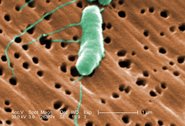Cholera
Contents
- 1 Introduction (Cholera)
- 1.1 Centers for Disease Control and Prevention
- 1.1.1 What is cholera?
- 1.1.2 How does a person get cholera?
- 1.1.3 What is the risk for cholera in the United States?
- 1.1.4 What should travelers do to avoid getting cholera?
- 1.1.5 Is a vaccine available to prevent cholera?
- 1.1.6 Can cholera be treated?
- 1.1.7 How long will the current epidemic last?
- 1.1.8 What is the U.S. government doing to combat cholera?
- 1.1.9 Where can a traveler get information about cholera?
- 1.1 Centers for Disease Control and Prevention
- 2 Note
- 3 Further Reading
Introduction (Cholera)
Centers for Disease Control and Prevention

In January 1991, epidemic cholera appeared in South America and quickly spread to several countries. A few cases have occurred in the United States among persons who traveled to South America or ate contaminated food brought back by travelers.
Cholera has been very rare in industrialized nations for the last 100 years; however, the disease is still common today in other parts of the world, including the Indian subcontinent and sub-Saharan Africa.
Although cholera can be life-threatening, it is easily prevented and treated. In the United States, because of advanced water and sanitation systems, cholera is not a major threat; however, everyone, especially travelers, should be aware of how the disease is transmitted and what can be done to prevent it.
The Centers for Disease Control and Prevention has developed answers to questions asked frequently about the disease and its cause:
What is cholera?

Cholera is an acute, diarrheal illness caused by infection of the intestine with the bacterium Vibrio cholerae. The infection is often mild or without symptoms, but sometimes it can be severe. Approximately one in 20 infected persons has severe disease characterized by profuse watery diarrhea, vomiting, and leg cramps. In these persons, rapid loss of body fluids leads to dehydration and shock. Without treatment, death can occur within hours.
How does a person get cholera?
A person may get cholera by drinking water or eating food contaminated with the cholera bacterium. In an epidemic, the source of the contamination is usually the feces of an infected person. The disease can spread rapidly in areas with inadequate treatment of sewage and drinking water.
The cholera bacterium may also live in the environment in brackish rivers and coastal waters. Shellfish eaten raw have been a source of cholera, and a few persons in the United States have contracted cholera after eating raw or undercooked shellfish from the Gulf of Mexico. The disease is not likely to spread directly from one person to another; therefore, casual contact with an infected person is not a risk for becoming ill.
What is the risk for cholera in the United States?
In the United States, cholera was prevalent in the 1800s but has been virtually eliminated by modern sewage and water treatment systems. However, as a result of improved transportation, more persons from the United States travel to parts of Africa, Asia, or Latin America where epidemic cholera is occurring . U.S. travelers to areas with epidemic cholera may be exposed to the cholera bacterium. In addition, travelers may bring contaminated seafood back to the United States; foodborne outbreaks have been caused by contaminated seafood brought into this country by travelers.
What should travelers do to avoid getting cholera?

The risk for cholera is very low for U.S. travelers visiting areas with epidemic cholera. When simple precautions are observed, contracting the disease is unlikely.
All travelers to areas where cholera has occurred should observe the following recommendations:
- Drink only water that you have boiled or treated with chlorine or iodine. Other safe beverages include tea and coffee made with boiled water and carbonated, bottled beverages with no ice.
- Eat only foods that have been thoroughly cooked and are still hot, or fruit that you have peeled yourself.
- Avoid undercooked or raw fish or shellfish, including ceviche.
- Make sure all vegetables are cooked; avoid salads.
- Avoid foods and beverages from street vendors.
- Do not bring perishable seafood back to the United States.
A simple rule of thumb is "Boil it, cook it, peel it, or forget it. "
Is a vaccine available to prevent cholera?
A recently developed oral vaccine for cholera is licensed and available in other countries (Dukoral ® from SBL Vaccines)[1] . The vaccine appears to provide somewhat better immunity and have fewer adverse effects than the previously available vaccine. However, CDC does not recommend cholera vaccines for most travelers, nor is the vaccine available in the United States. Further information about Dukoral® can be obtained from the manufacturers.
Can cholera be treated?
Cholera can be simply and successfully treated by immediate replacement of the fluid and salts lost through diarrhea. Patients can be treated with oral rehydration solution, a prepackaged mixture of sugar and salts to be mixed with water and drunk in large amounts. This solution is used throughout the world to treat diarrhea. Severe cases also require intravenous fluid replacement. With prompt rehydration, fewer than 1% of cholera patients die.
Antibiotics shorten the course and diminish the severity of the illness, but they are not as important as rehydration. Persons who develop severe diarrhea and vomiting in countries where cholera occurs should seek medical attention promptly.
How long will the current epidemic last?
Predicting how long a Cholera epidemic will last is difficult. The cholera epidemic in Africa has lasted more than 30 years. In areas with inadequate sanitation, a cholera epidemic cannot be stopped immediately, and, although far fewer cases have been reported from Latin America and Asia in recent years, there are no signs that the global Cholera pandemic will end soon. Major improvements in sewage and water treatment systems are needed in many countries to prevent future epidemic cholera.
What is the U.S. government doing to combat cholera?
U.S. and international public health authorities are working to enhance surveillance for cholera, investigate cholera outbreaks, and design and implement preventive measures. The Centers for Disease Control and Prevention investigates epidemic cholera wherever it occurs and trains laboratory workers in proper techniques for identification of V. cholerae. In addition, the Centers for Disease Control and Prevention provides information on diagnosis, treatment, and prevention of cholera to public health officials and educates the public about effective preventive measures.
The U.S. Agency for International Development is sponsoring some of the international government activities and is providing medical supplies to affected countries.
The Environmental Protection Agency is working with water and sewage treatment operators in the United States to prevent contamination of water with the cholera bacterium.
The Food and Drug Administration is testing imported and domestic shellfish for V. cholerae and monitoring the safety of U.S. shellfish beds through the shellfish sanitation program.
With cooperation at the state and local, national, and international levels, assistance will be provided to countries where cholera is present, and the risk to U.S. residents will remain small.
Where can a traveler get information about cholera?
The global picture of cholera changes periodically, so travelers should seek updated information on countries of interest. The Centers for Disease Control and Prevention maintains a travelers' information telephone line on which callers can receive recent information on cholera and other diseases of concern to travelers. Data for this service are obtained from the World Health Organization. The number is 877-FYI-TRIP (394-8747) or check out http://www.cdc.gov/travel .
October 6, 2005
Note
CDC is not responsible for the content of Web pages found at these links. Links to nonfederal organizations are provided solely as a service to our users. These links do not indicate an endorsement of these organizations by CDC or the federal government.
Use of trade names is for identification only and does not imply endorsement by the U.S. Department of Health and Human Services.
^Dukoral ®
SBL Vaccin AB,
SE-105 21 Stockholm, Sweden
telephone +46-8-7351000,
e-mail: info@sblvaccines.se
website: www.sblvaccines.se